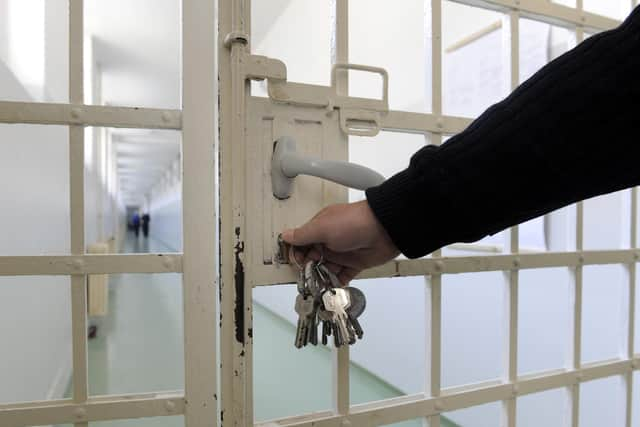14-year-old boy held in cell at Bradford Magistrates Court for 11 hours, damning report reveals


The revelation is made in a report into children being held for hours in court cells for hearings while awaiting legal representation or transport.
The 14-year-old boy in question was kept for hours after a hearing at the court in Bradford before being driven home late at night.
Advertisement
Hide AdAdvertisement
Hide AdOther children with Downs syndrome and autism were among those detailed as being kept for unacceptable lengths of time in cells in the annual report published by custody watchdog the Lay Observers (LO).


The document, published today (Friday), branded the treatment of some young people, including those with disabilities, as“totally unacceptable” and a “matter of embarrassment” for the criminal justice system, saying that young defendants with health issues were "falling through the gaps".
It also raised concerns about "filthy" cells and “complicated” transport arrangements made between police, courts and prisons, as well as warning of poor record-keeping of medical needs and a lack of sanitary items for female detainees in some cell blocks.
The conditions are putting the welfare of vulnerable people and access to justice in “jeopardy”, the report said, adding that the problems are “compounded” by poor communication between different bodies and authorities.
Advertisement
Hide AdAdvertisement
Hide AdLO national chairman John Thornhill said the problems have a “concerning impact” on access to justice, adding: “It is clear some people have to appear in court having travelled hundreds of miles, others are not supported with their medical conditions or disabilities; some are then kept in dirty court cells for hours on end.


“This is a matter of embarrassment in a modern criminal justice system.”
The report described “dirty cells” with food and liquids “spattered up the walls” in some cases while others were “covered” in abusive graffiti some of which was racist or gang and drug related.
In other courts across the country, similar instances detailed included a young boy with Downs’ syndrome had to wait four hours to see his solicitor at Westminster Magistrates’ Court due to a lack of available space and a young boy with autism who became “very emotional and unstable” while waiting in a Southampton Magistrates’ Court cell for more than two hours while transport was arranged.
Advertisement
Hide AdAdvertisement
Hide AdThe report highlighted the “totally unacceptable” treatment of a 16-year-old girl who, after being sentenced in the late afternoon at Plymouth Magistrates’ Court, was not moved from custody until 10pm to make a 235-mile journey to Rainsbrook Secure Training Centre near Rugby in Warwickshire, where she arrived at 3am.
There were also concerns raised about young people being transported in the same vehicle as adult offenders for long periods of time.
Although there had been welcome improvements in the past year and the majority of custody and escort staff were “doing their best to deliver a decent and respectful service often in difficult circumstances”, Mr Thornhill added: “To many children and vulnerable adults have their welfare put at risk because of extremely poor record keeping, which leads to critical medication not being available for people with conditions like asthma and diabetes, the risk of violence to staff and other detainees.”
A Ministry of Justice spokeswoman said cell conditions were monitored regularly and that Prisoner Escort and Custody Service (PECS) contracts would be in place at the end of August, which would take into account recommendations from HMIP and Lay Observers.
Advertisement
Hide AdAdvertisement
Hide AdThe spokeswoman said: “We are pleased the Lay Observers found there had been welcome improvements in custody services and recognised the good work by staff.
“The welfare of young and vulnerable people is a priority. New contracts which begin next month will place greater emphasis on improving decency and welfare for those in custody and minimise time in cells.”